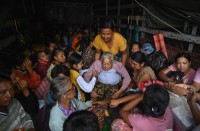by Jenny Vaughan and Tran Thi Minh Ha
Agence France Presse
MEO VAC, Vietnam (AFP) — Vu Thi Dinh spent weeks scouring the rugged Vietnamese borderland near China after her teenage daughter vanished with her best friend, clutching a photo of the round-faced girls now feared sold as child brides.
The anguished mother showed everyone she met the snap of the 16-year-old friends Dua and Di in white and red velvet dresses, the words “Falling Into You” printed above their photoshopped picture.
They went missing in February during an outing in Meo Vac, a poor mountainous border zone a stone’s throw from China.
Their mothers fear they were sold in China on one of the world’s most well-trodden bride trafficking circuits.
“I wish she would just call home to say she is safe, to say ‘please don’t worry about me, I’m gone but I’m safe,'” said Dinh, bursting into tears.
She is among countless mothers whose daughters have disappeared into China where a massive gender imbalance has fuelled an unregulated buy-a-bride trade.
Most people in this part of Vietnam have a story about bride trafficking.
High-school students talk of kidnapped cousins. Husbands recall wives who disappeared in the night. And mothers, like Dinh, fear they may never see their daughters again.
“I warned her not to get on the backs of motorbikes or meet strange men at the market,” she says from her mud-floored home where she expectantly keeps a closet full of her daughter’s clothes.
She’s not heard from Dua since she went missing, unable to reach her on the mobile phone she bought just a few weeks before she disappeared.
– ‘Marriage by capture’ –
The victims come from poor communities and are tricked by boyfriends and sold, kidnapped against their will or move across the border by choice for marriage or the promise of work.
Like many of the missing, Dua and Di are from the Hmong ethnic minority, one of the country’s poorest and most marginalized groups.
Traffickers target girls at the busy weekend market, where they roam around in packs dressed in their Sunday best, chatting to young men, eyeing the latest Made-in-China smartphones or shopping for lipstick and sparkly hair clips.
Or they find them on Facebook, spending months courting their victims before luring them into China.
It is a sinister departure from the traditional Hmong custom of ‘zij poj niam’, or ‘marriage by capture’, where a boyfriend kidnaps his young bride-to-be from her family home — sometimes with her consent, sometimes not.
Others are enticed by the promise of a future brighter than that which awaits most girls who stay in Ha Giang: drop out of school, marry early and work the fields.
“They go across the border to earn a living but may fall into the trap of the trafficking,” said Le Quynh Lan from the NGO Plan International in Vietnam.
Vietnam registered some 3,000 human trafficking cases between 2012 and 2017.
But the actual number is “for sure higher”, said Lan, as the border is largely unregulated.
Ly Thi My never dreamed her daughter would be kidnapped, since the shy Di rarely went to the market or showed much interest in boys.
Just two weeks after that photo shoot with Dua, the giggling girls went for a walk in the rocky fields near their homes.
They never came back.
“We think she was tricked and trafficked as a bride, we don’t know where she is now,” said My.
– Fluid border –
Her worst fear is the teenagers are now child brides or have been forced to work in brothels in China where there are 33 million more men than women due to a long-entrenched preference for male heirs.
The trip across the 1,300-kilometer (800-mile) border is an easy one, said Trieu Phi Cuong, an officer with Meo Vac’s criminal investigations unit.
“This terrain is so rugged, it’s very hard to monitor,” he told AFP at a border crossing marked by a few waist-high posts as a Vietnamese man nearby sold a cage of pigeons to a customer on the China side.
Many victims don’t even know they’ve crossed into China — or that they’ve been trafficked.
Lau Thi My was 35 and fed up with her husband, an abusive drunk, when she grabbed her son and headed to the border.
She went with a neighbour who promised her good work in China, but she fell prey to traffickers.
My was separated from her son and sold three times to different brokers before a Chinese man bought her as a wife for about $2,800.
“He locked me up several times, I hated him,” said My, who fled after 10 years by scrabbling together enough money for the journey home.
She is now back with her Vietnamese husband — still a drinker — in the same home she escaped a decade ago, a smoke-filled lean-to where her dirt-streaked grandchildren run about.
But she’s desperate for word from her son.
“I came back totally broken… and my son is still in China, I miss him a lot,” she said.
© Agence France-Presse








